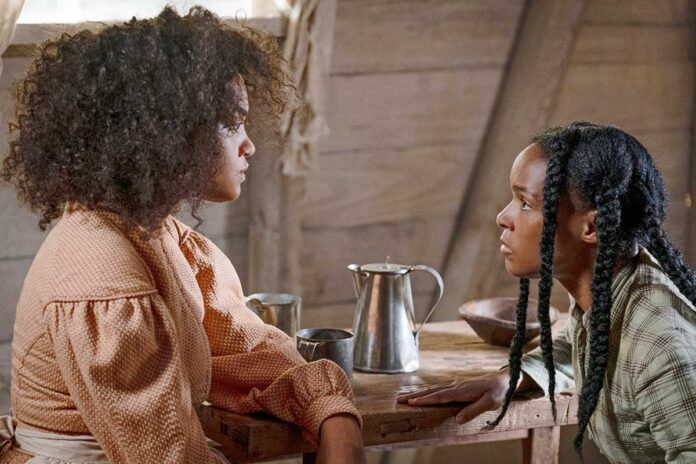“Antebellum,” starring queer actress/singer Janelle Monáe is a crowd-pleasing thriller that deals with issues of race, slavery, and female empowerment. The film, available September 18 on premium on demand platforms, is an auspicious debut for the writing and directing team of Gerard Bush and Christopher Renz, who are making obvious but necessary parallels to Black Lives Matter. Their crafty approach to the subject unfolds in three parts — each designed to unsettle the audience. It ultimately pays off.
The film opens with a pre-credit sequence that employs a nifty tracking shot that weaves around a Southern plantation, a group of soldiers, a handful of slaves, and the Confederate flag before it involves the capture of two runaway slaves — one male, one female. Shot in slow motion, one of them dies horrifically as the other watches, helpless.
It is a harrowing sequence and it sets the tone for more brutality to come. “Antebellum” shows Eden (Monáe) arriving at the plantation run by Captain Jasper (Jack Huston) and his wife, Elizabeth (Jena Malone). Eden is quickly beaten and branded, and her despair is palpable. As six weeks pass, she is seen picking cotton in the fields, and “only speaking when given permission.” While Professor (Tongayi Chirisa) wants to escape Eden insists they bide their time for the right moment.
When that moment will come is a question asked by Julia (out actress Kiersey Clemons) who arrives on the plantation and befriends Eden. Julia, who is pregnant, cannot tolerate being a slave, and challenges Eden’s advice to “keep your head down and your mouth shut,” by responding, “Being quiet — what has that ever gotten us?” Watching these two actresses debate speaking up and acting out gives the slow-burning “Antebellum” some initial friction.
Likewise, when Julia is “courted” by Daniel (Robert Aramayo) a Confederate soldier, their exchange is fraught with tension and possibility. Will he harm her? Will he help her? The film is engrossing as mini-dramas such as these play out, even in expected ways.
However, at the end of the first act, the filmmaker introduces a twist that takes “Antebellum” in a whole new direction. Suddenly, it is present day, and Veronica (Monáe in a double role) is a successful professor who is talking about race, inequality, disenfranchisement, and intersectionality on TV and at conferences. She is powerful and inspiring speaking to a room full of Black women about threatening the patriarchy and “losing our chains” of oppression. But Veronica is also vulnerable — she confides to her best friend Dawn (Gabourey Sidibe) that she does not feel she is good enough as a wife and mother.
The differences between the two characters, Eden and Veronica, are perhaps etched in bold relief, but as Veronica goes about her day, she has encounters that echo things from Eden’s life. Veronica is chastised about speaking by a young white girl in an elevator. She also experiences microaggressions from the hotel’s concierge and has concerns about the lack of cleaning and turn down service for her room. Veronica suspects something is going on, but she can’t quite identity what it is.
“Antebellum” deliberately keeps the truth hidden and the “thrills” to a minimum until it finally reveals its sleight-of-hand. It is a nifty twist — even if detractors may find it preposterous or poke holes in the plotting. But even as film folds in on itself, the insidiousness of the situation presented will have audiences cheering during the film’s violent denouement.
One can imagine Bush and Renz being almost giddy with delight as they thought up the plot and its execution. And while there will likely be comparisons to Jordan Peele’s “Get Out,” and “Us,” that does not diminish the achievement of “Antebellum” or its message. The film uses language very deliberately, and there are symbols, including a monument to Robert E. Lee, that play important roles in the dramatic action. Likewise, scenes such as Dawn calling out a restaurant hostess for seating her and Veronica at an unacceptable table, are gratifying. Sibourey has great fun in her role; she particularly shines in a scene where she lectures a guy on how to buy a woman a drink.
Monáe is very forceful in her dual role, making Eden sympathetic and Veronica emboldened. She acts mostly by reacting, and her expressions communicate so much of what her character(s) are thinking and feeling. She never gets too showy in either part, which makes her ferocity during the film’s energetic finale rousing.
In support, Kiersey Clemons makes the troubled Julia sympathetic during her handful of scenes. In contrast, Jena Malone may be saddled with a one-dimensional, racist character in Elizabeth, but her acting to the hilt becomes cartoonish.
Bush and Renz are painting with a broad brush here, but their wildly entertaining film should prompt folks to think critically about the issues of oppression and racism.
